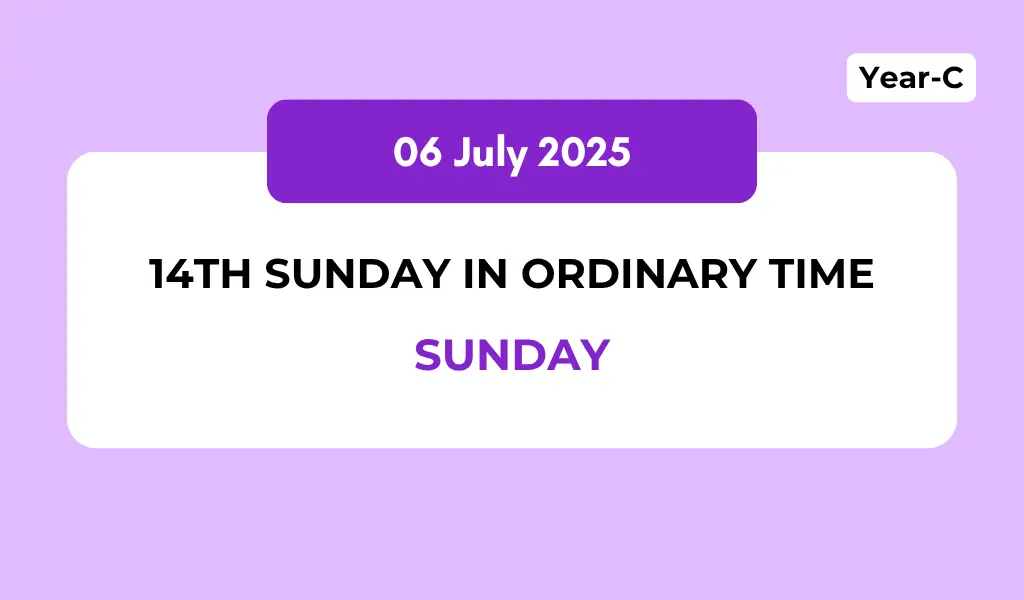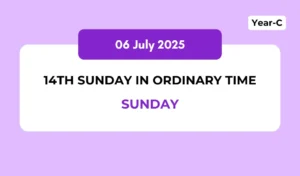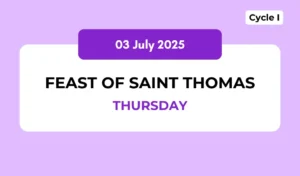First Week of Lent
22nd February 2024 (Thursday)
Psalter: Week 1
Reading of the Day
First Reading: 1 Peter 5:1-4
Beloved: I exhort the elders among you, as a fellow elder and a witness of the sufferings of Christ, as well as a partaker in the glory that is going to be revealed: shepherd the flock of God that is among you, exercising oversight, not under compulsion, but willingly, as God would have you not for shameful gain, but eagerly; not domineering over those in your charge, but being examples to the flock. And when the chief Shepherd appears, you will receive the unfading crown of glory.
Psalm 23:1-3a, 3b-4, 5, 6 (R. 1)
R/. The Lord is my shepherd; there is nothing I shall want.
Verse Before The Gospel
V/. Glory and praise to you, O Christ
R/. Glory and praise to you, O Christ
V/. You are Peter, and on this rock I will build my church, and the gates of hell shall not prevail against it.
R/. Glory and praise to you, O Christ.
Gospel : Matthew 16:13-19
At that time: When Jesus came into the district of Caesarea Philippi, he asked his disciples, “Who do people say that the Son of Man is?” And they said, “Some say John the Baptist, others say Elijah, and others Jeremiah or one of the prophets.” He said to them, “But who do you say that I am?” Simon Peter replied, “You are the Christ, the Son of the living God.” And Jesus answered him, “Blessed are you, Simon Bar-Jonah! For flesh and blood has not revealed this to you, but my Father who is in heaven. And I tell you, you are Peter, and on this rock I will build my church, and the gates of hell shall not prevail against it. I will give you the keys of the kingdom of heaven, and whatever you bind on earth shall be bound in heaven, and whatever you loose on earth shall be loosed in heaven.”
Daily Gospel Reflection
Highlight: Chair that is fair!
Guidelines: In a world that constantly plays a musical “chair’, fighting for power and authority by hook or crook, the holy Catholic Church must recapture the true spirit of Christian power and authority
1. Today we feast on the Chair of St Peter. This implies the authority of the papacy over the Universal Catholic Church. We accept the pope’s authority by the principle of succession to St Peter.
2. Thereby, in the first place, on this feast day, we must remind ourselves that we all belong to one church and we all owe our allegiance and subscribe our loyalty to the one church. Thus, it is a call for unity, adherence, and obedience
3. Therefore, any division and discrimination, any dissension and disparity, any rivalry and conflicts is nothing but a counter-witness to the very nature of the church. In this context, the church on various levels, be it the divergent countries, rites, dioceses, or religious congregations must do a humble self-critique about their spirit of unity, equity and fraternity
4. This feast is not a celebration of authority but of responsibility because Peter’s authority is not his own. It came from the Lord. He was invested with power by the Lord. Thus, the papal authority or the hierarchical authority is not a self-acquisition. It is due to God. Besides, it is not an authority for subjugation or domination.
5. Thus, St Peter in his first letter in the first reading exhorts us: “Tend the flock that is entrusted to you, not forcefully or indifferently or selfishly, but willingly, eagerly and authentically”. All authority is but a sacred responsibility for the animation, coordination, and rejuvenation of Christian life
6. The purpose of all power and authority is the following of the Lord. It is never self-directed but God-centered, God-directed, and other-oriented. The exercise of all authority is meant to bring the people closer to God, to give them the taste of faith, and to groom them in love.
7. This in fact is the very crux of the Great Commission, the parting mandate of the Lord: Go and make disciples of all the nations … teach them to obey everything that I commanded you (cf. Matthew 28. 19-20). It is also to “love the Lord passionately and follow him in feeding and tending the flock” (cf. John 21. 15-19)
8. But this duty of the authorities to guide and lead others also essentially implies that they themselves are guided and led by the Lord. Those who demand others to obey them must also obey the Lord. Those who make others follow the Lord must themselves follow him. They need to “walk the talk”!
Practice: The church can really suffer when the spirit of authority degenerates into power-mongering and self-seeking. The purpose of authority is lost when division and manipulation become the rule of authority







